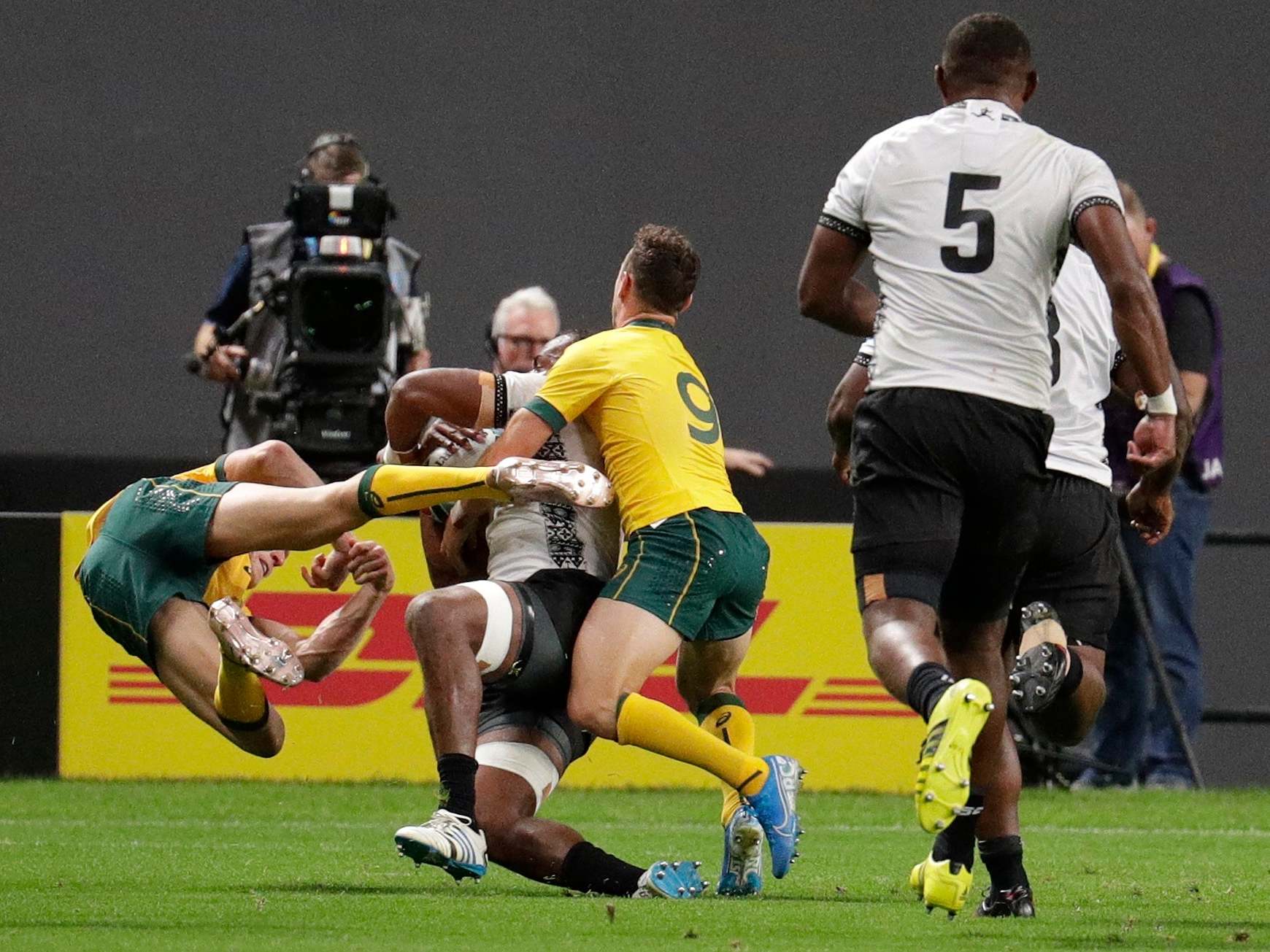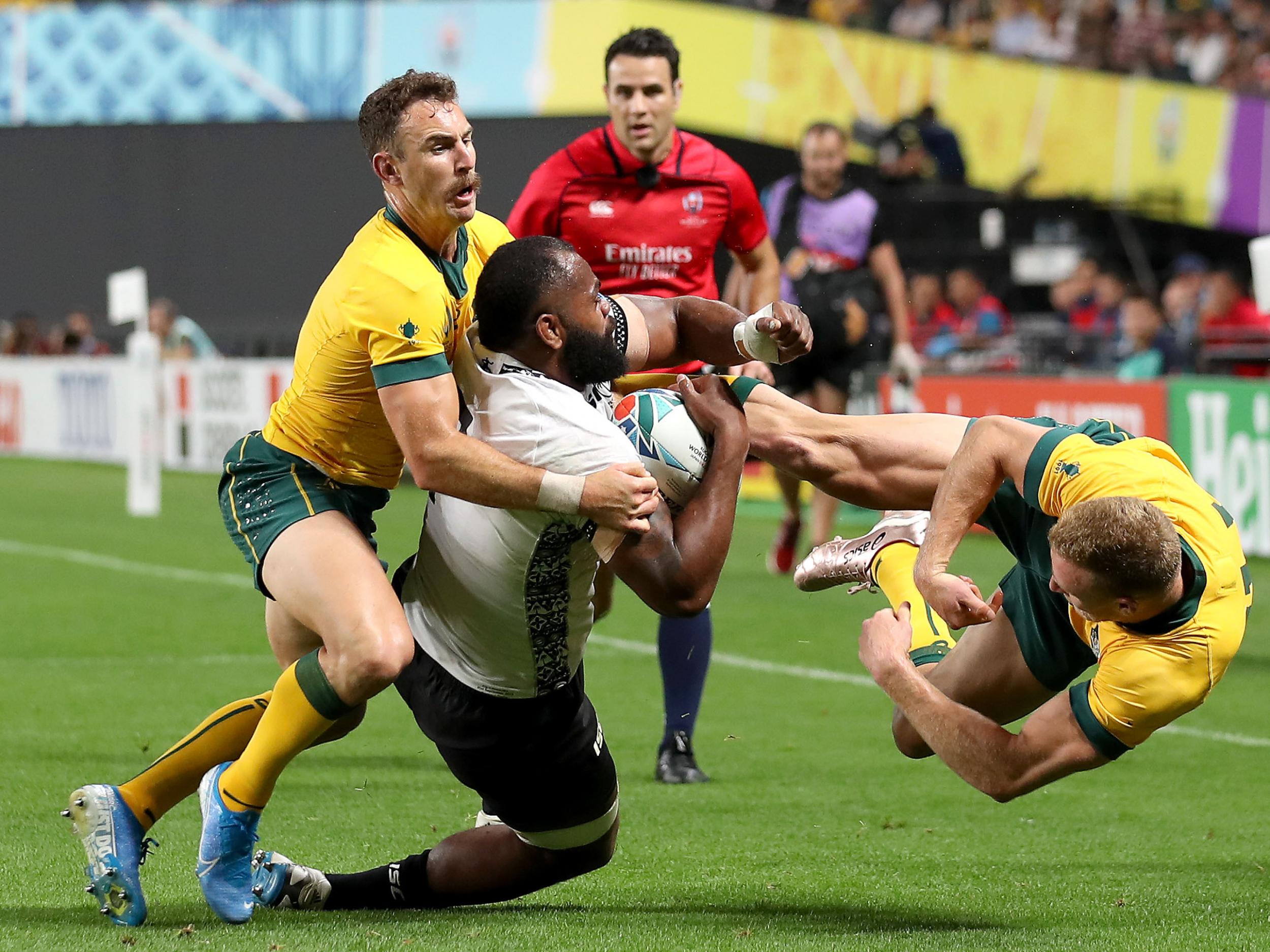Rugby World Cup 2019: What more can World Rugby do if officials fail to see the danger in Reece Hodge’s tackle?
Australia wing should have been sent off for a dangerous tackle that left Fiji’s Peceli Yato concussed, yet not one but two officials felt that it fell on the side of legal – and that beggars belief

Your support helps us to tell the story
From reproductive rights to climate change to Big Tech, The Independent is on the ground when the story is developing. Whether it's investigating the financials of Elon Musk's pro-Trump PAC or producing our latest documentary, 'The A Word', which shines a light on the American women fighting for reproductive rights, we know how important it is to parse out the facts from the messaging.
At such a critical moment in US history, we need reporters on the ground. Your donation allows us to keep sending journalists to speak to both sides of the story.
The Independent is trusted by Americans across the entire political spectrum. And unlike many other quality news outlets, we choose not to lock Americans out of our reporting and analysis with paywalls. We believe quality journalism should be available to everyone, paid for by those who can afford it.
Your support makes all the difference.If you have ever played, watched or reported on rugby union you will have sympathy for the referees.
Such a technical, physical, powerful game played these days at close to the speed of light. Decisions must be made in an instant. Sometimes, in the case of the breakdown, several must be made in the blink of an eye. It's a tough job, but someone's got to do it.
Throw into the mix millions of eyeballs and a growing need to mitigate the increase in pace, power and commitment with new protocols, implemented by the officials in the middle, and it’s not controversial to say refereeing rugby union is one of the toughest jobs in sport.
But not everything about it is hard. On occasions, in fact, it's really quite simple.
Which is why the failure by the match officials to show a red card to Australia winger Reece Hodge for a blatantly reckless and dangerous hit on Fiji flanker Peceli Yato 25 minutes into a game the Wallabies eventually went on to win defied explanation.
Hodge was cited on Sunday morning although precisely what good that will do for Fiji or for the hugely influential Yato – who did not return to the field after suffering a concussion in the incident – is anyone’s guess. He should have been sent off when it counted. It defined the game. It cost Fiji the match.
To make matters worse, the incident was seen by on-field referee Ben O’Keefe, who referred it to Television Match Official Rowan Kitt, and between the two of them they decided there was no case to answer.
Come on guys, you can do better than that.
There has been some scaremongering in recent years about rugby’s drive to reduce a concussion epidemic which threatened to make the game unviable if it went unchecked.
Those who believe almost anything should go on the field argued rugby would go soft by addressing head injuries while the same macho willy wavers mocked attempts to introduce safety measures aimed at protecting players.
Mercifully those arguments have long since been lost and there is now a genuine and determined belief among enough people who count in the sport that head-high tackling should be confined to history and referees should be empowered to send players off who don’t play ball.
To simplify matters and make referees, spectators and players lives easier, a tick-box chart was introduced following a World Rugby player welfare symposium held in Paris last March following the deaths of four French players in a year, which leads us through the decision-making process for potentially dangerous tackles.
Essentially it goes thus; is there contact with the head? Is there an attempt to wrap the arms around the opponent’s body? Are there any mitigating circumstances?
If the answer is “yes” to the first two and no to the third then the referee has no option but to show a red card.

Ignore all the noise around games being spoiled and look at the cool hard facts. Hodge’s concussion-inducing hit ticked every box and by failing to send him off, O’Keefe and his team made a mockery of months of work to educate all involved in the sport that these sort of head shots are no longer acceptable.
It was in plain sight. It ticked every box. It should have been red. Sorry, no excuses.
To rub salt in the wound for Fiji, the magnificent Yato played no further part in the game and will inevitably miss their next game against Uruguay on Wednesday.
Hodge went on to score a try as Australia pulled clear in the second half. He should not have been on the field. If he hadn’t been, Fiji may well have won.
The referee’s failure to implement the laws surrounding high tackles caused the controversy. Nothing more, nothing less. You can hardly blame World Rugby if the officials don’t do their job.

For all the pre-tournament talk around player welfare, O’Keefe and his officials got it horribly wrong in Sapporo on Saturday.
Sunday morning’s citing was too little, too late. By not showing a red on the field for such a clear breach of the laws, confusion now reigns where there should have been clarity.
On so many occasions refereeing rugby union is hard. So many decisions to make, so little time.
But in this case it was simple. The officials failed to spot what was clear for all to see and Fiji, and Yato, paid a heavy price.
Join our commenting forum
Join thought-provoking conversations, follow other Independent readers and see their replies
Comments